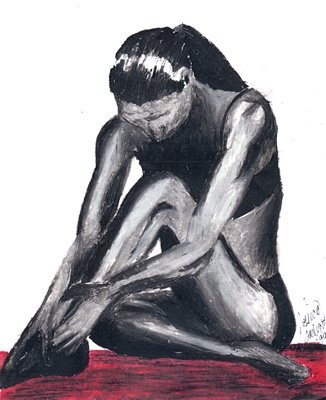All Nonfiction
- Bullying
- Books
- Academic
- Author Interviews
- Celebrity interviews
- College Articles
- College Essays
- Educator of the Year
- Heroes
- Interviews
- Memoir
- Personal Experience
- Sports
- Travel & Culture
All Opinions
- Bullying
- Current Events / Politics
- Discrimination
- Drugs / Alcohol / Smoking
- Entertainment / Celebrities
- Environment
- Love / Relationships
- Movies / Music / TV
- Pop Culture / Trends
- School / College
- Social Issues / Civics
- Spirituality / Religion
- Sports / Hobbies
All Hot Topics
- Bullying
- Community Service
- Environment
- Health
- Letters to the Editor
- Pride & Prejudice
- What Matters
- Back
Summer Guide
- Program Links
- Program Reviews
- Back
College Guide
- College Links
- College Reviews
- College Essays
- College Articles
- Back
Six Myths About Eating Disorders MAG
As a sufferer from an eating disorder, I often encounter ignorance and stereotypes about this group of illnesses – particularly in the media. Misunderstandings range from the benign (for example, the technically correct term for someone with anorexia nervosa is anorectic, not anorexic) to the life-threatening (these are serious illnesses with up to a 25 percent fatality rate).
When it comes to this issue, knowledge isn't just power, it's the power to save lives. So I've compiled some of the most pervasive and damaging myths about eating disorders (in order from least to most harmful, in my opinion) and dispelled them, using information from the National Eating Disorders Association and my own experience.
Myth #6: People with anorexia nervosa (AN) do not eat anything.
Anorectics generally do eat, sometimes even three meals a day. They just don't consume enough calories to maintain a healthy body weight. They may also have rituals around eating or purposely avoid eating with others, so it may seem like they don't eat at all.
Myth #5: Bulimia nervosa (BN) is when you throw up after meals.
Throwing up can be a symptom, but those suffering with BN often have more than one way to “purge” (that is, rid themselves of binges – a lot of food consumed in one sitting – or normal meals). They may abuse laxatives, fast, or exercise obsessively. All of these behaviors are dangerous and require medical attention.
Myth #4: There are only two eating disorders: anorexia and bulimia.
They get a lot of media attention, but BN and AN are only two of the illnesses that fall under the category of eating disorders. Several other types exist. For example, binge eating disorder is when you repeatedly eat large amounts of food and feel intense shame about it. Pica is the urge to eat non-food items such as dirt and chalk.
There are also eating disorders not otherwise specified (EDNOS), in which someone starves, purges, or overexercises but doesn't meet the traditional criteria for AN or BN. As many as 50 percent of those with an eating disorder have EDNOS, and need treatment just like as those with BN or AN. I was diagnosed with EDNOS and have been hospitalized several times, which caused pain for me and my family, and damaged me physically and emotionally.
Myth #3: Bulimic behaviors (such as self-induced vomiting) are not harmful or lethal.
Sadly, this myth contributes to the death of many with BN. Normal vomiting is very stressful to the mouth and esophagus, exposing them to extremely corrosive stomach acid. Vomiting frequently can result in reflux (when food and/or stomach acid comes up unintentionally) and loss of tooth enamel (and once it's gone, it's gone). And laxative abuse can cause incontinence, constipation, and diarrhea. In addition, frequent vomiting causes dehydration as the body loses electrolytes that help it perform vital functions like maintaining heart beat. Thus, all bulimics are at risk for sudden death, no matter how often they purge.
Myth #2: People with binge eating disorder aren't that ill, and the consequences aren't that severe.
Overeating can cause as many health problems as not eating enough. Highlights include high blood pressure (which contributes to heart attack and stroke), high cholesterol, type II diabetes, and gastric rupture (the stomach literally rips as a result of having too much food in it – fatal in 80 percent of cases). People who overeat regularly struggle with emotional problems just like those with BN and AN, they just show it in a different way.
Myth #1: You can tell if someone has an eating disorder (and how bad it is) by how thin they are.
People with serious eating disorders come in all shapes and sizes. Bulimics and those with EDNOS in particular tend to suffer from this myth because many maintain a normal weight throughout their illness but are still invisibly devastating their bodies. Serious medical consequences, especially from repeated fasting and restricting calories, are swift and severe, even without the warning sign of dramatic weight loss.
In the four years I've had an eating disorder, I have only been underweight once for a short time, but have suffered the following symptoms: reflux, diarrhea and constipation, low pulse/blood pressure, orthostatic hypotension (blood pressure so low that I became dizzy and blacked out), fatigue, insomnia, dry skin, brittle hair, severe headaches, heart arrhythmia, electrolyte imbalance, dehydration, depression, and suicidal thoughts.
That's a daunting list, and one I hope no one else has to experience, because the mental anguish of these disorders is bad enough without fearing that your body will shut down as well.
But there is hope. Eighty percent of those who get help within five years of getting an eating disorder will recover fully. Many people regain their healthy mind and body and go on to live normal, fulfilling lives. But first we must get past the myths and tackle that initial step: Admitting you have a problem and getting help.

Similar Articles
JOIN THE DISCUSSION
This article has 10 comments.
